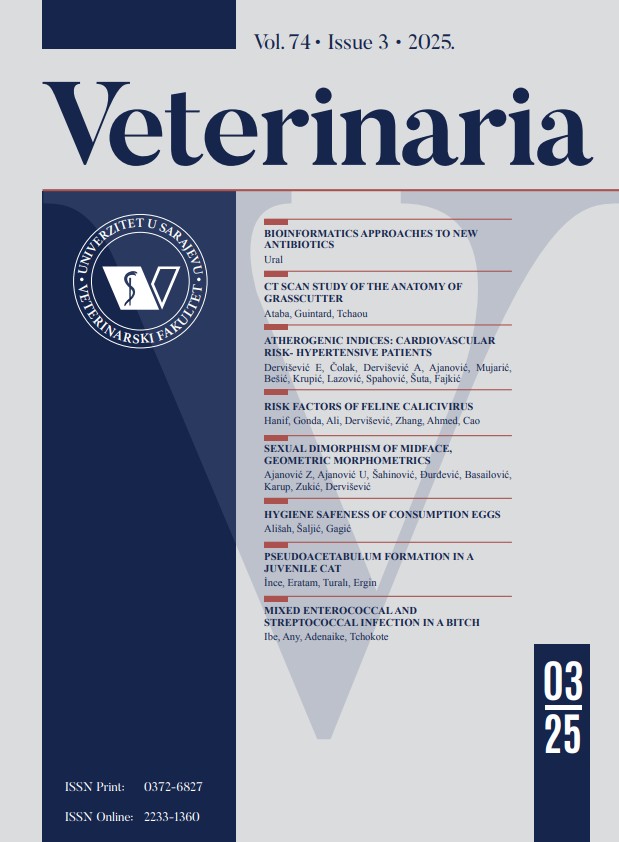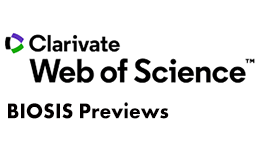About the Journal
FOCUS AND SCOPE
Veterinaria is an international open access journal of veterinary research that publishes original papers and reviews on a wide range of veterinary topics. Research Article, Short Communication, Case Report, Review Article, and Letter to Editor are subject to peer review. Articles should be written in the English language. As of July 2024, the journal has expanded its scope to include research on environmental health, environmental management, environmental protection, and ecology, reflecting its commitment to addressing the interconnectedness of veterinary and environmental sciences.
Other type of paper (professional papers, book reviews, student papers, news, reports, comments…) should be written in the English or Bosnian language and they are published at the discretion of the Editor (non peer reviewed articles).
Veterinaria is the official journal of the University of Sarajevo - Veterinary faculty, and has been published since 1951.
Veterinaria is indexed in Clarivate Web of Science - BIOSIS Previews, EBSCO, DOAJ, CAB abstracts (CAB international) and Google scholar.
PUBLICATION FREQUENCY
Three issues of the Veterinaria are published annually.
ARTICLE PROCESSING CHARGES.
Veterinaria has neither submission charge nor article processing charges.
PUBLICATION ETHICS AND PUBLICATION MALPRACTICE STATEMENTS
The publication of an article in a peer-reviewed journal is an essential building block in the development of a coherent and respected network of knowledge. It is a direct reflection of the quality of work of the author and the institutions that support them. Peer-reviewed articles support and embody the scientific method. It is therefore important to agree upon standards of expected ethical behavior.
Editorial independence and support
We are ensuring that potential for any commercial revenue has no impact or influence on editorial decisions. We are commited to supporting editors in communication with other journals and/or publishers where it is useful to editors, as well as to provide editors with technical, procedural and legal support.
Publication Decisions
The editor of a learned journal is solely and independently responsible for deciding which of the articles submitted to the journal should be published. The editor is required to regard issues such as copyright infringement and plagiarism. The editor may confer with other editors or reviewers in making these decisions.
Peer review process
Peer-review is the system used to assess the quality of a manuscript before it is published. Independent researchers in the relevant research area assess submitted manuscripts for originality, validity and significance to help editors determine whether the manuscript should be published in their journal. This journal uses double-blind review, which means that both the reviewer and author identities are concealed from the reviewers, and vice versa, throughout the review process. All articles are submitted to language and scientific review written by acknowledged experts from particular fields.
The responsible editor appoints reviewers with consent from the Editorial Board. It is a common practice to appoint two or three reviewers in a particular field in conformity with recommendations of the editor/ Editorial Board. Acceptance of an article for publication depends on the final appraisal of reviewers. Generally, the appraisal of the article can lead to different types of recommendations such as:
acceptance of the article without revision,
acceptance of the article with a minor revision,
a new review of the article following revision,
rejection of the article.
If two reviewers differ in their final appraisal of the article it is recommended that the editor /Editorial Board send the article to the third reviewer for additional reading and final appraisal. Four repeated appraisals stating that „a new review of the article following revision“is needed, automatically imply rejection of the article. The reviewed articles are returned to the author with comments and recommendations. However, the names and final appraisals of reviewers will not be disclosed to the author. Publishers and editors shall take reasonable steps to identify and prevent publication of papers where research misconduct has occured. Reasons for rejecting the article are as follows: unimportant subject matter, lack of originality, significant scientific errors, and shortcomings in presentation of results (poor quality of illustrations), disregard of general instructions to authors or irrelevance of the manuscript for the audience the journal is intended for.
Duties of Reviewers
Contribution to Editorial Decisions:
Peer review assists the editor in making editorial decisions and through the editorial communications with the author may also assist the author in improving the paper. Reviewers are asked generally to treat authors and their work as they would like to be treated themselves and to observe good reviewing etiquette.
Any selected referee who feels unqualified to review the research reported in a manuscript or knows that its prompt review will be impossible should notify the editor and decline to participate in the review process.
Confidentiality:
Any manuscripts received for review must be treated as confidential documents. Reviewers must not share the review or information about the paper with anyone or contact the authors directly without permission from the editor. Unpublished materials disclosed in a submitted manuscript must not be used in a reviewer’s own research without the express written consent of the author. Privileged information or ideas obtained through peer review must be kept confidential and not used for personal advantage.
Alertness to Ethical Issues:
A reviewer should be alert to potential ethical issues in the paper and should bring these to the attention of the editor, including any substantial similarity or overlap between the manuscript under consideration and any other published paper of which the reviewer has personal knowledge.
Any statement that an observation, derivation, or argument had been previously reported should be accompanied by the relevant citation.
Objectivity and Competing Interests:
Reviews should be conducted objectively. Reviewers should be aware of any personal bias they may have and take this into account when reviewing a paper, and should express their views clearly with supporting arguments. Reviewers should consult the Editor before agreeing to review a paper where they have potential conflicts of interest resulting from competitive, collaborative, or other relationships or connections with any of the authors, companies, or institutions connected to the papers.
Fair play
The editor should evaluate manuscripts for their intellectual content without regard to race, gender, sexual orientation, religious belief, ethnic origin, citizenship, or political philosophy of the authors. The editorial policies of the journal should encourage transparency and complete, honest reporting, and the editor should ensure that peer reviewers and authors have a clear understanding of what is expected of them. The editor should use the journal’s standard electronic submission system for all journal communications The editor shall establish, along with the publisher, a transparent mechanism for appeal against editorial decisions.
Confidentiality
The editor must protect the confidentiality of all material submitted to the journal and all communications with reviewers, unless otherwise agreed with the relevant authors and reviewers. This journal uses double-blind review, which means that both the reviewer and author identities are concealed from the reviewers, and vice versa, throughout the review process.
Declaration of Competing Interests
Any potential editorial conflicts of interest should be declared to the publisher in writing prior to the appointment of the editor, and then updated if and when new conflicts arise. The editor must not be involved in decisions about papers which he/she has written him/herself or have been written by family members or colleagues or which relate to products or services in which the editor has an interest. Further, any such submission must be subject to all of the journal’s usual procedures, peer review must be handled independently of the relevant author/editor and their research groups, and there must be a clear statement to this effect on any such paper that is published.
Autorship of the paper
All authors should have made substantial contributions to all of the following: (1) the conception and design of the study, or acquisition of data, or analysis and interpretation of data, (2) final approval of the version to be submitted, (3) drafting the article or revising it critically for important intellectual content Authors are obliged to participate in peer review process. Authors are obliged to provide retractions or corrections of mistakes, as well as to provide list of references and financial support. It is forbidden to publish same research in more than one journal.
Plagiarism and originality
Authors should have publish entirely original works, and if they have used the work of others, that this has been appropriately cited.
“ Veterinaria “ takes publication eth¬ics very seriously and verifies the originality of content submitted before publication. Every paper submitted will be checked for plagiarism with suitable software. In the event of alleged or suspected research misconduct, e.g., plagiarism, cita¬tion manipulation, and data falsification/fabrication, the Editorial Board will follow and act in accordance with COPE guidelines.
Acknowledgement of sources
Proper acknowledgment of the work of others must be given.
Disclosure and conflicts of interest
All authors must, within the paper, include disclosure of all actions and relationships that could be viewed as a conflict of interest.
Fundamental errors in published works
If an author discover a major error or inaccuracy in their own work, it's authors obligation to alert the journal editor and cooperate with the editor in resolving the issue.
Reporting standards
Authors of reports of original research should present an accurate account of the work performed as well as an objective discussion of its significance.
Journal metrics
The editor must not attempt to influence the journal’s ranking by artificially increasing any journal metric.
ETHICS IN ANIMAL EXPERIMENTATION:
An approval of research protocols by an Animal Ethics Committee in accordance with international principles is required for experi¬mental, clinical and drug studies and for some case reports that are carried out on animals. If required, ethics committee reports or an equivalent official document will be requested from the authors. For studies carried out on animals, the measures taken to prevent pain and suffering of the animals should be stated clearly. The name of the ethics committee, and the ethics committee approval num¬ber should be stated in the “Methods” section of the manuscript. For studies involving client-owned animals, author’s must provide the information on informed consent from the client or the owner and adherence to a high standard (best practice) of veterinary care. The editor has the right to reject manuscripts on suspicion of ani¬mal welfare or research protocols that are not consistent with the international principles of animal research. The scientific and ethi¬cal responsibility of the research belongs to the authors.
COPYRIGHT AND ACCESS
Authors who publish with this journal agree to the following terms:Authors retain copyright and grant the journal right of first publication with the work simultaneously licensed under a Creative Commons Attribution License that allows others to share the work with an acknowledgement of the work's authorship and initial publication in this journal.Authors are able to enter into separate, additional contractual arrangements for the non-exclusive distribution of the journal's published version of the work (e.g., post it to an institutional repository or publish it in a book), with an acknowledgement of its initial publication in this journal.
ARCHIVING
This journal utilizes the LOCKSS system to create a distributed archiving system among participating libraries and permits those libraries to create permanent archives of the journal for purposes of preservation and restoration. (https://www.lockss.org/)
PRIVACY STATEMENT
The names and email addresses entered in this journal site will be used exclusively for the stated purposes of this journal and will not be made available for any other purpose or to any other party.
OPEN ACCESS POLICY
This journal provides immediate open access to its content on the principle that making research freely available to the public supports a greater global exchange of knowledge. As authors of articles published in Veterinaria you are the copyright holders of your article.
Contact:
E-mail: veterinaria@vfs.unsa.ba
Telephone: (+387) 033 729 100
Telephone/fax: (+387) 033 617 850







